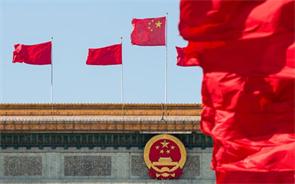https://youtu.be/oS5QqS9C_xw
Few Westerners see the irony of a supposedly closed China celebrating the 100th anniversary of the founding of the Chinese Communist Party (CCP), when communism was born but essentially rejected in the West. What was it about Marx that resonated with Chinese civilisation that prided itself with its own ancient and enduring philosophy? (PIC: Chinese President Xi Jinping waves as he attends a gala in connection with the anniversary - AP)
"Globalisation is interpreted as universalisation of American or European values and standards. But the fact remains that these standards and rules were imposed historically by conquest, colonisation and force".
China Does Not Recognize The Rule-Based International Order imposed historically by Conquest, Colonisation and Force !
https://youtu.be/_ThU1vvW0A4
China has never interfered in the internal affairs of other countries and never obstructed their development. It will never accept any country interfering in China's internal affairs and obstructing its development. Today's China has long been different from the China of 100 years ago. No one and no force should underestimate the Chinese people's firm will and strong ability to defend national sovereignty, security, and development interests.
WHY is Marxism thriving in China and not in Marx’s place of birth? Why is Buddhism more practiced in East Asia than in India? Why has Islam more followers outside Saudi Arabia?
Ideas and religion spread through globalisation, but it was really their localisation that created more believers and followers.
What succeeded was not globalisation, but glocalisation, the internalisation of universal ideas and beliefs by the many, and not just the few.
Few Westerners see the irony of a supposedly closed China celebrating the 100th anniversary of the founding of the Chinese Communist Party (CCP), when communism was born but essentially rejected in the West.
What was it about Marx that resonated with Chinese civilisation that prided itself with its own ancient and enduring philosophy?
London School of Economics Emeritus Professor Megnai Desai, writing on “Marx’s Revenge”, made the shrewd observation that the Chinese Revolution in the 20th century was very different from the French and American Revolutions in the 18th century.
The French Revolution was a domestic rebellion against the monarchy and the landed gentry, whilst the American Revolution was rebellion against British foreign domination
Both created republics and preached equality, liberty and freedom, but both went on to create empires, one by conquering lands from the native Indians and Mexico, and the other through Napoleon’s rampage in Europe.
The Chinese Revolution was different because it was simultaneously a struggle against foreign invasion (Japanese and earlier Eight Nations Alliance) as well as the Nationalist government that favoured the capitalist and landed classes.
The CCP won because it represented the rural peasantry, rather than adopting the Comintern strategy of starting the revolution from the cities. In short, the CCP localised universal Communism with Chinese characteristics. It was practical rather than ideological.
By the time of the fall of the Qing Dynasty in 1911, Chinese thinkers struggled with what would replace the old order.
The country fell into warlordism. The Nationalist Party under Sun Yat-sen struggled to balance the conservative wing that represented the landlords and capitalists, and the left wing influenced by Communism and socialism.
Chinese revolutionaries followed closely the Russian Revolution in 1917, because it was then the most recent model of social transformation. The Chinese elite understood that the rebuilding of China from the collapse of the old order was a monumental task. The country was backward and the uneducated masses were unprepared for modernity, vulnerable to foreign conquest.
Even though they felt the burden of history, they also understood that there was no parallel in history on the scale of Chinese transformation.
The Chinese Left took to Marxian thinking because Marx gave both a historical and political economy perspective on how capitalism would evolve, as well as a philosophical tool in terms of Hegelian dialectics.
Marx used the profound insights of the Prussian philosopher Hegel that transformations come from contradictions of opposites, in which change will not happen in a smooth line, but through revolution or discontinuity.
Marx’s discovery of dialectic materialism – in everything, the contradiction and interaction between opposites lead to the destruction of the old and emergence of the new – was music to the ears of those who sought a path out for the New China.
Furthermore, the fundamental ideas of dialectics were very similar to the Chinese yin-yang philosophy of the I Ching and Dao Dejing. As Lenin put it, “dialectics is the study of the contradiction within the very essence of things. Development is the struggle of opposites.”
Having theory is one thing, but putting these ideas into practice is another. We can only appreciate China’s miraculous transformation from a backward economy to the second largest economy in the world by understanding that this was done through essentially three dictums: “seek truth from facts”, crossing the river by feeling the stones” and “it doesn’t matter whether a cat is black or white, as long as it catches mice.”
In other words, make fact-based decisions, always try or test under uncertainty, and above all, be practical and have an open mind. Change is a process between conflicting contradictions. There is no absolute black and white.
Historian Ray Huang, one of the finest sinologists of his generation and a former Nationalist soldier, wrote in the Preface to his classic “China: A Macro-History”: “Chinese history differs from the history of other peoples and other parts of the world because of an important factor: its vast multitudes.
In the imperial period as well as in the very recent past, practical problems had to be translated into abstract notions in order to be disseminated.
In turn, at the local level the message had once again to be rendered into everyday language.”
It is the reduction of very complicated policies into simple language that the Chinese people had to understand and own that enabled them to buy into the transformation, despite the huge sacrifices at the individual and community levels. The people’s eyes are clearer than those of the elites.
The US-China rivalry has done the world a favour by contrasting very fundamental worldviews. When the West preaches a value and rules-based order, what is meant is that freedom, democracy and individual rights are absolute – essentially a zero-sum “my way or no way.”
Globalisation is interpreted as universalisation of American or European values and standards. But the fact remains that these standards and rules were imposed historically by conquest, colonisation and force.
When China, Russia, India or any other country deviates or disagrees with that, then they must be contained, confronted or sanctioned. Localisation or being different is almost seen as deviant rather than a celebration of diversity.
Civilisations reach their highest levels through tolerance and openness. When they become inward-looking, fundamentalist and mono-thinking, fragility and decay sets in.
The world is simultaneously becoming more global in inter-connectivity, even as regionalisation, fragmentation and localisation speeds up.
Glocalisation, the simultaneous contradiction between global and local, is to be welcomed, rather than feared.
The future will always be open, uncertain and contradictory. Such diversity is the nature of humanity.
Andrew Sheng comments on global affairs from an Asian perspective. The views expressed here are his own
Footage of a brutal gang attack on Asian students |Daily Mail ...
https://www.dailymail.co.uk/


The much larger group attacks the three Asian students outside an Inala shopping centre (pictured) as one girl is pulled to the ground by her hair
South China Sea regional countries shouldn't fall into US trap: Global Times editorial
China will join hands with countries within the region and try its best to smash the US intention of destabilizing the region.
RELATED POSTS:
World main countries 2021 Q1 GDP Growth Infographic: Wu Tiantong/GT Xi Jinping: Chinese people will never allow foreign bullying, oppres..










 China Wen:Serve the people well, aim for big accomplishments, not big titles!
China Wen:Serve the people well, aim for big accomplishments, not big titles!